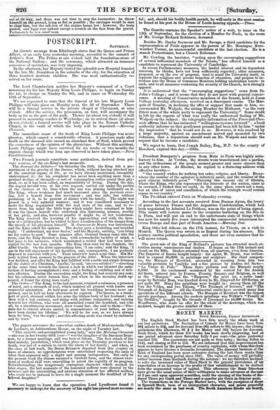The Lord Chamberlain notifies her Majesty's command of a Court
mourning for his late Majesty King Louis Philippe, to begin on Sunday the 1st, to change on Sunday the 8th, and to cease on Wednesday the 11th of September.
We are requested to state that the funeral of his late Majesty Louis Philippe will take place on Monday next, the 2d of September. There will be a funeral service in the private chapel at Claremont, at nine o'clock. After the service, the procession, on foot, will accompany the body as far as the gate of the park. Thence (at about ten o'clock) it will proceed in mourning coaches to Weybridge; on its arrival there (at about eleven o'clock) a funeral service will take place in the Roman Catholic Chapel, in the vault of which the body will be deposited—Morning Chronicle.
The immediate cause of the death of King Louis Philippe was acute pleurisy, which caused a considerable effusion. A puncture made after death on the diseased side caused an abundant flow of fluid, which proved the correctness of the opinion of the physicians. Without this accident, Louis Philippe might have survived for six weeks or two months the organic change which was long ago observed to have taken place.—Parie Constitutionnel.
Two French journals contribute some particulars, derived from pri- vate sources, of the ex-King's last momenta.
The Journal des Ddbats--" On Saturday the 24th, the Bing felt a pre- sentiment of the gravity of the disease, which without having attacked any of the essential organs of life, as we have nlready mentioned, insensibly undermined it; for his complaint has never been anything more than a gradual decline of strength—a sort of consumption rather moral than phy- sical, or, as it has been called, an impossibility of living. During the day, the august invalid was, at his own request, carried out under the portico of the chateau at the time when the sun was shining brilliantly on it. The King, whose weakness had much increased since the previous even- ing, felt a benefit from this movement ; and was able, but without partaking of it, to be present at dinner with his family. The night was passed in a very agitated manner; and it was considered necessary to make the King acquainted with the real state of his case, and to re- move from his mind the little hope which might have remained to him. It was the Queen herself who undertook this distressing mission, worthy of her piety, and also, however painful it might be, of her tenderness. The King received the warning of his approaching end with the firm- ness of a philosopher, but he wished to have a confirmation of his danger from the mouth of his physician himself. M. Gueneau de Mussy was introduced, and the King asked his opinion. The doctor gave a hesitating and troubled reply. I understand, my dear doctor,' said his Majesty, smiling, 'you bring me my notice to quit. Some minutes after, General Dumas came into the room, and the King dictated to him, with a remarkable lucidity of mind, a last page to his memoirs, which terminated a recital that had been inter- rupted for the last four months. The King then sent for his chaplain, the Abbe Guelle. On the Abbe approaching him, am calm,' said the King, am in the full enjoyment of my faculties, and, consequently, I am perfectly disposed to converse with you.' Their interview lasted some time. His Ma- jesty replied from memory to the prayers of the Abbe. When the interview was finished, and after the King had fulfilled with a noble and simple firmness all the duties of a Christian, Amelie,' he said, 'are you satisfied ?'—directing at the same time towards the Queen a look in which was blended the satis- faction of having accomplished a duty and a feeling of confiding and of deli- cate affection. During the succeeding night, the King had scarcely any rest; but his calmness never forsook him, and when in the morning death ap- peared, it found the dying man ready." The Ordre—" The King, to the last moment, retained a calmness, a presence of mind, and a strength of soul, which inspired all present with tender and respectful admiration. At half-past seven his breathing became more op- pressed, and in half an hour afterwards he expired. The Queen, in a trans- port of grief, strained within her arms the lifeless body. of her husband ; she then took a last embrace, and rising with sublime resignation, and turning towards her children, who were all assembled round the deathbed, and who all, by a simultaneous movement, drew round her, she said to them—'Pro- m me to remain always united in remembrance of your father, as you have been during his lifetime.' We will be for you, as we have always been for him,' was the reply ; and this affecting scene was closed by embraces and by tears."


























 Previous page
Previous page